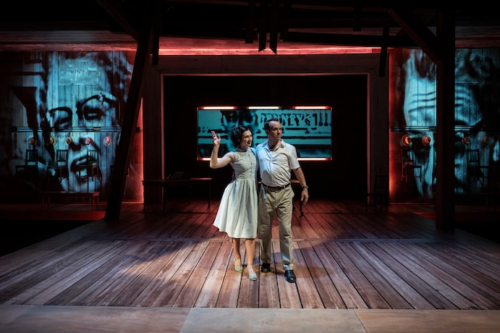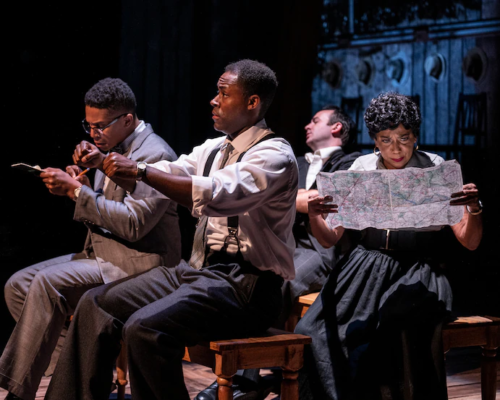Decades in the making, a trio of plays celebrates the life of the murdered Black teen Emmett Till and commemorates his tragic 1955 death.

When playwright Ifa Bayeza set out in the late 1990s to tell the story of Emmett Till — the Black 14-year-old who was abducted and lynched by two White men in 1955 Mississippi — the United States was still recovering from a crack epidemic that disproportionately affected African American communities. In reflecting on Till, Bayeza says she wanted to “pull our own youth back from that brink, to say, ‘We have to see ourselves as human beings.’ ”

The result was “The Ballad of Emmett Till,” a celebration of Till’s life and retelling of his tragic death that premiered at Chicago’s Goodman Theatre in 2008. Now an updated version of that play is onstage at Mosaic Theater in repertory with two more Till-centric works from Bayeza: “Benevolence,” which debuted at Penumbra Theatre in St. Paul, Minn., in 2019, and the world premiere of “That Summer in Sumner.”
Together, the three plays — all directed by Talvin Wilks and drawing from the same 10-person cast — make up “The Till Trilogy.” While the drug epidemic that prompted the project is mercifully in the past, the social justice movement’s resurgence and the corresponding conversation over how to teach Black American history have punctuated the subject matter’s importance in newfound ways.
“It feels particularly timely,” Bayeza says, referring to Till’s murder — often credited with sparking the civil rights movement. “But it is, unfortunately, timeless.”
“The plays show why it is of value to understand our history and to witness it,” Wilks adds, “because these stories in many ways are still suppressed and repressed.”
Although the original production of “Ballad” was a sprawling, 2½-hour history play, Bayeza streamlined it into a 90-minute chamber piece for a 2010 production at Los Angeles’s Fountain Theatre. The distillation improved “Ballad,” Bayeza says, but she still found herself bothered by the scenes that she cut.

So Bayeza revisited some of that excised material, expanded on it and wrote “Benevolence,” a decades-spanning examination of Till’s legacy through the eyes of two couples — one Black, one White — grappling with his death. Earlier this year, she completed work on a third play, also derived from trimmed “Ballad” scenes: “That Summer in Sumner,” which explores the Till murder trial and the Black journalists who covered the case.
“The trilogy really evolved from my commitment to telling this sacred story as best I could,” Bayeza says, “and to represent it with the epic fullness that it felt like to me.”
Wilks directed a 2014 version of “Ballad” at Penumbra Theatre before returning there to helm the “Benevolence” premiere. In mounting the full trilogy, he has reimagined those productions so that all three plays work in harmony, while still functioning as stand-alone stories. Bayeza also massaged the plays’ through lines by tweaking the scripts throughout the rehearsal process.
“I learned a lot having directed those first two plays,” Wilks says. “There’s a foundation there. But thinking of them in tandem sort of is a whole new game. New collaborators, new artistry, new innovation, but also — I’ll say it — limitations. The framework brings a kind of limiting factor to how you uniquely envision each play.”
The Mosaic production has been a long time coming: Wilks and the “Till Trilogy” company were a month into rehearsal in the spring of 2020 when pandemic closures put the endeavor on hold. Since then, real-world developments have deepened the plays’ resonance, from the Black Lives Matter protests of 2020 to the Emmett Till Antilynching Act that President Biden signed into law earlier this year.
“It had already felt really relevant,” says Billie Krishawn, who plays six characters — including Till’s mother, Mamie — across the three plays. “But then the world shut down and the events throughout the pandemic happened, with Breonna Taylor and George Floyd and Ahmaud Arbery and countless names that I couldn’t even begin to list off and do it justice. Then I felt even deeper inside of the movement.”

Krishawn wasn’t alone in forging an intimate connection with Till’s story. Antonio Michael Woodard, who portrays Till in two of the plays, says he was making deliveries for DoorDash in his hometown of Oakland, Calif., when a man in an affluent neighborhood confronted him on the street and screamed a racial slur at him. “That ran through my body in a particular way,” Woodard recalls. With Till on his mind, he says, he kept his calm.
“You want to do something, but in this society, if I was to do something, I’d be in the wrong,” Woodard says. “Literally the next day, I kid you not, I got the offer to play Emmett Till. That’s how I know I’m interconnected and I have a mission. I’m on assignment to do this, because I don’t believe I would have gone through that for no reason.”
For the predominantly Black cast, the production’s challenges go beyond the creative and logistical burdens of playing various characters over multiple plays. There’s also the matter of processing the traumatic material. To help the Black actors navigate that challenge, Wilks says, the production has used mental health advisers and a fight and intimacy director.
“We have to be mindful of that wonderful, generous and courageous spirit,” Wilks says. “These actors are stepping into these roles to share these stories for a community still witnessing and wrestling and reckoning with this history.”
That history is still evolving. This past August, a Mississippi grand jury declined to indict Carolyn Bryant Donham, the White woman whose accusation of a sexual advance led to Till’s lynching, on charges of kidnapping and manslaughter, despite the discovery of an unserved warrant for her arrest. And “The Till Trilogy” isn’t alone in presenting an artistic depiction of Till’s story: The film “Till,” which tracks Mamie Till’s pursuit of justice following her son’s death, arrives in theaters this week.
“I do see the Till saga as a national foundation myth, really looking in an epic and poetic way at how the fault line of race cuts across geography, cuts across gender, cuts across class, cuts across politics and the law,” Bayeza says. “It’s like a flash of lightning in that so many elements come together in this tragedy of Emmett Till that it speaks to the time — whenever that time is.”
If you go
The Till Trilogy
Atlas Performing Arts Center, 1333 H Street NE. 202-399-7993, ext. 501. mosaictheater.org.
Dates: Through Nov. 20.
Prices: $50-$64 per play.
Review by Thomas Floyd for the Washington Post.